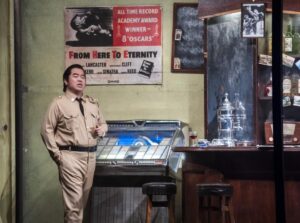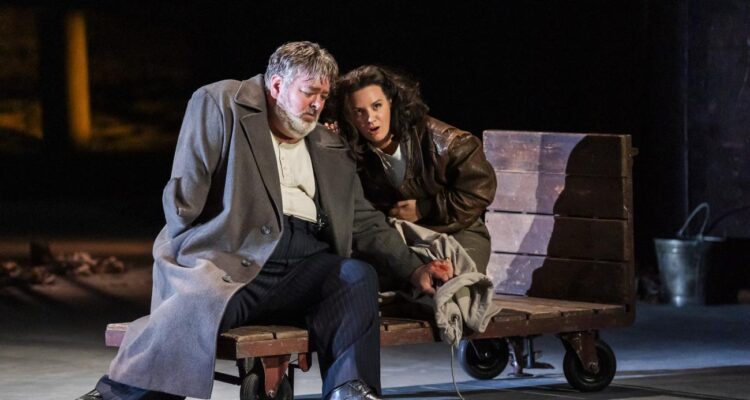This is the 14th outing at the ENO of Jonathan Miller’s 1982 Godfather production of Verdi’s Rigoletto. The Renaissance Court of Mantua is here translated into the mafioso world of 1950s Little Italy in NYC. I was fortunate to catch it in the 1980s when it was as sharp as a tack, pure firebrand Miller, with Miller’s Rigoletto as imaginative and inventive as Michael Bogdanov’s or Trevor Nunn’s ground-breaking Shakespeare productions at the time.
With Rigoletto Verdi crashed through his own sound-barrier: the bar or barrier could not be set higher. This tremendous father-daughter opera broke the mould through the sheer tug-of-war at its heart between magical tunes and moral transgression. Who can blame Maddalena or Gilda for loving the philandering predator? He does, after all, sing the most instantly recognizable aria in all Italian opera, not to mention the sublime ‘Bella figlia dell’amore’: to woo a prostitute. Miller famously launches ‘La donna è mobile’ on a jukebox in Sparafucile’s sleazy bar, a director’s Midas touch that seamlessly connects this grand opera tune to pop culture.

Right at the outset, from the dark timbre of the orchestral prelude to the Duke of Mantua’s effervescent credo of ‘Questa o quella’, the ENO’s orchestra was firing on all cylinders under the baton of the brilliant Richard Farnes. The music and arias of Rigoletto are the stuff of legend, and last night did not disappoint; even if, arguably, the revival directed by Elaine Tyler-Hall may have lost some of the edge of the show’s first runs forty-plus years ago.
Among the principals Robyn Allegra Parton shone in the magnificent ‘Caro nome’, one of the Everests of the soprano voice. The aria’s vocal acrobatics were executed with a pellucid clarity that at times recalled Maria Callas’s renditions of the same. Parton was superb too in the scenes outside Sparafucile’s bar, and again in her dying prayer, singing with infinite sweetness and pathos about joining her mother in heaven, a mother she has never known, and praying for her poor father. If last night’s performance had a star above all others, it was Parton as Gilda.
The father-daughter scenes worked well, even if at times Gilda and Rigoletto seemed to be singing to us rather than to, and with, each other. Weston Hurt’s interpretation of the court jester title role was robust and heartfelt, from his cruel taunting of Monterone, another doomed father of a seduced daughter, to his Lear-like despair at the end, as he desperately clings to the hope that Gilda may yet live. Yongzhao Yu was a revelation for his exquisite, sweet tenor voice and his effortless ability to act. He seemed just a tad too nice to be the Duke of Mantua or a Corleone capo dei capi. But that paradox is written into the role of the duke: he is always singing as if his preying on women were the driver of his voice. The last time we hear him he is again singing ‘La donna è mobile’, off-stage and, presumably, post-coitally, while Gilda lies dying. Inevitably, given how famous the opera’s tunes are, one almost longed for Yongzhao Yu to slip into the Italian of Piave’s libretto. Just to experience the magical meshing of music and Italian vowels as penned by Piave in his most fruitful collaboration with Verdi outside of Traviata. That said, James Fenton’s translation of the libretto still works well and grounds the opera in ways that the original can never quite achieve for non-Italian audiences.
William Thomas as Sparafucile, Amy Holyland as Maddalena, and Sarah-Jane Lewis as Giovanna all impressed with their clear musical delivery; Amy Holyland perfectly partnering her hitman brother, a murderer-for-hire who will not renege on a deal, even if the deal is murder.
Last night an engrossed audience must have been wondering – I know I did – how a company as brilliant as the ENO, at home in one of London’s most iconic venues, could possibly be struggling to survive. The orchestra and conducting were quite simply world-class as indeed was the overall sheer professionalism of the revived Miller production.
Rigoletto was written in 1851.
It premiered on March 11 of that year at the Teatro La Fenice in Venice.
Music by Giuseppe Verdi (1813–1901)
Libretto written by Francesco Maria Piave.
Translation of libretto into English: James Fenton
Conductor: Richard Farnes
Director: Sir Jonathan Miller
Revival Director: Elaine Tyler-Hall
Cast includes: Weston Hurt; Yongzhao Yu; Robyn Allegra Parton;
ENO Harewood artists: Amy Holyland; Patrick Alexander Keefe; William Thomas (a former ENO Harewood artist)
Sung in English with Surtitles
Until: 21 Nov 2024

